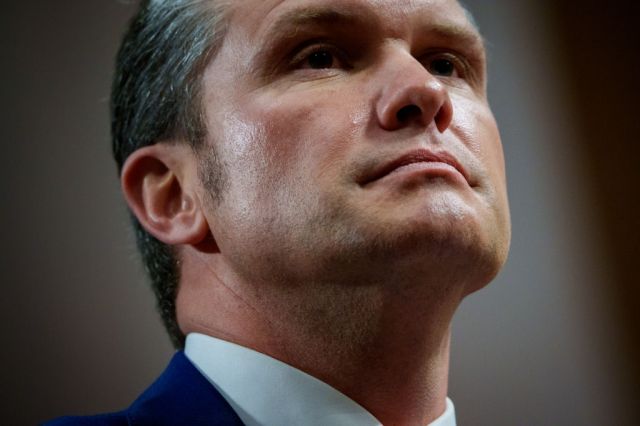"It was just a fucking mess." Andrew Harnik/Getty Images.

“It was just a fucking mess.” That’s how Pete Hegseth, Trump’s new Defense Secretary, describes America’s post-9/11 wars. We are aboard his plane, flying home to Washington from Guantanamo Bay, where he had spent the day overseeing migrant-removal operations. This is all part of President Trump’s push to gain “100% operational control of the southern border” as Hegseth summed up the mission before a gathering of the troops at the naval facility.
The Washington Post had just published a story in which migrants processed through Gitmo alleged mistreatment. The media, Hegseth told the service members, don’t appreciate what the joint task force is up to, and their coverage “frankly is, you know, full of a lot of bullshit”.
Between his salty language, camo hoodie, and the “We the People” tattooed across a forearm, the former Fox News anchor is unlike any previous Pentagon chief. To spend time with Hegseth is to remember that feeling of crashing parties on Greek Row as an undergrad.
His bro-y-ness — which gave rise to serious allegations of womanizing and hard drinking, some false or exaggerated, others harder to sidestep — made him Trump’s toughest confirmation battle. In the end, it took a tie-breaking vote from Vice President JD Vance to get him through. Tapping Hegseth to run the Department of Defense attested to the President’s utter disregard for DC convention, doubly so the second time around.
Yet the bro vibes can also be deceiving. The Ivy-educated Hegseth has a sophisticated grasp of the challenges facing the United States this century. He represents a generation of officers embittered by what used to be called the War on Terror, and is bent on ditching the bipartisan consensus that led America to take up regime change and nation-building. As one senior defense official in his inner circle told me: “Pete believes he was lied to, and he believes he has to shake up the [national-security] complex”.

The visit to Gitmo was a strange homecoming of sorts for Hegseth, who served as a National Guard lieutenant on the prison facility before volunteering to fight in Iraq and Afghanistan, for which he earned the Bronze Star. “A lot of guys and gals of my generation started out just proud to be serving, proud to be contributing,” he tells me. “‘Hey, we were attacked, and we wanna be part of that collective response, and no questions asked, let’s go do it.’”
In Hegseth’s case, this meant not only personally fighting in George W. Bush’s wars, but making the case for expanding and escalating them. In 2007, in between military stints, Hegseth became executive director of Vets for Freedom, a Bill Kristol-advised group that advocated for the Iraq “surge” and assailed politicians of both parties — but especially Democrats, and one Barack Obama, for insufficient hawkishness.
Looking back on the post-9/11 wars now, Hegseth tells me “we would be foolish not to” notice that “they cost our country dearly: in blood, in treasure, in reputation. And the more you look at them, the more you realize the depth of the folly around what we thought we were gonna create in Iraq and Afghanistan”. The results: “Iran effectively controls Iraq, the Taliban effectively controls Afghanistan”.
Against that backdrop, you can see why the Trumpians’ repurposing of Gitmo — from a retirement home for aging al-Qaeda masterminds into a deportee-processing center — would be popular. “We’ve spent 20 years defending other people’s borders,” Hegseth told US troops. “It’s time to lock down ours on behalf of the American people. We deserve to know who’s coming into our country, what their intentions are, and where they’re coming from.”
Since 31 January, the migrant operation, drawing from every branch of the military except the Space Force, has constructed 195 tents to house deportees while they’re processed. Once the administration’s plans are fully realized, capacity will ramp up to as many as 30,000. I wasn’t permitted to view the high-security area used for 9/11-era detainees and the particularly bad hombres. The still-unoccupied tents in the non-classified area lack air conditioning, and even in late February, the Cuban climate was sweltering.
“I was like this for four months in Baghdad — no AC,” I overheard Hegseth telling an officer while inspecting the tents. “But fact is, you are safe, you are fed, you are not in the rain.” Fair enough. And then, too, the newcomers face much harsher conditions on the trek to the southern border, during which they are frequently preyed upon by smugglers, with women and girls routinely raped.

The question is whether all this is worth the expense. So far, Gitmo has processed a grand total of 177 deportees, according to one Department of Defense adviser I spoke to. Most have been “high-priority” cases, as determined by the Department of Homeland Security (DHS) based on gang affiliation and criminal histories. The day I visited, a massive C-17 aircraft delivered nine more for processing. “The C-17 costs $25,000 an hour to operate,” I overheard one service member. “So those nine that came in, you could’ve given each of them a first-class ticket.”
Isn’t this all typical Trump showiness?
Hegseth disagrees. The Department of Defense “has sheer capacity that DHS and [Immigration and Customs Enforcement (ICE)] don’t have. . . If I don’t have a border wall, and I don’t have [barbed] wire everywhere, and I don’t have eyes everywhere. . . then how do you secure the border? Well, that becomes a pretty manpower-intensive effort at the beginning. Because you’ve got to flood the zone and interdict”. The armed forces can certainly do manpower. Border crossings are down 94% from the same period last year, according to the Border Patrol, “stupidly effective numbers” that Hegseth in big part credits to the military’s assistance to DHS and ICE.
The fear associated with the very name “Gitmo” is part of it, too, something Hegseth didn’t shy from underscoring: “If you’re [a migrant] looking around going, ‘Hey, if I cross the border, I’m going to get immediately arrested, and instead of being facilitated and processed into the country, I’m going to be held temporarily, put on a C-17, and flown home — or flown to Gitmo?’ A lot of people start to say, ‘Meh, not gonna do it.’”
***
The US military is a miracle of state capacity, a fact showcased by the migrant-housing buildup on Gitmo. It should have taken 21 days on paper but was accomplished in a little more than a week. Such capacity doesn’t come cheap, however. The armed forces take up the largest non-entitlement share of the federal budget, $824 billion last year. And with Elon Musk’s Department of Government Efficiency (DOGE) squeezing the federal budget, is Hegseth worried about weakening capacity?
“Other than contingencies and our troops in the field . . . that’s the thing that occupies my mind the most,” he says. “We’re refocusing our priorities, we’re looking for efficiencies, we’re gonna pass an audit.” Still, “when I look at the budget, I’m always going to make recommendations to the president” — the emphasis here seemed to signal: not to Musk — “that we fund it in a way that ensures that we are always the biggest, the baddest, and most prepared for the next conflict. And I don’t care what the dollar amount is.”
Notably, Hegseth has directed the Pentagon not to comply with Musk’s recent ukase requiring all federal employees to write an email summarizing five things they achieved the previous week. Did he make that call on his own? Yes. “We made the call to say, ‘We’re going to do this process internally,’ because of the sensitivities of the Defense Department. But also respecting Elon and DOGE and what they’re doing. If there are people that can’t answer their email and reply with what they’re working on, then what are we doing here?”
One big driver of budgetary bloat is the Pentagon’s dependence on a handful of defense contractors: Northrop Grumman, Raytheon, Boeing, Lockheed Martin, and General Dynamics, the so-called primes which have earned a lousy reputation for delivering late and typically billions of dollars over-budget. During his confirmation, Hegseth touted his independence from these mega-firms and vowed to shake up the procurement process.
“Get creative, disrupt the process, bring in people who are not part of the revolving door,” he says of his approach to procurement. “I don’t know how you can do this job properly, on behalf of the American people and under the guidance of the commander in chief, if you’re invested in one contractor or another.”
He adds: “I think we’ve had plenty of clouded judgment over the years: stacking the deck in favor of a company or [weapons] system instead of saying, ‘Clean plate, here’s what we’ve got, here’s what’s working, here’s what isn’t, here’s contractors that are bloated and out of control, and we’re going to use the Defense Production Act and emergency powers to renegotiate, because we’ve been bent over a barrel on this.’”
Under the existing procurement model, smaller firms have a hard time getting a foot through the door. “Your classic examples are your Palantirs and your Andurils,” a reference to defense-technology startups that integrate artificial intelligence into warfighting. Palantir and the like, says Hegseth, are “investing their own money in R&D, [and] have far more commercial business, so they’re not fully dependent on the DoD, but they’re patriots who want to invest.”
Hegseth is committed to making room for such innovators, yet it’s hard to pin him down on what, concretely, the procurement shakeup might entail: “We’re gonna do the same competitive processes, but we’re not going to play by the same bureaucratic rules that we have in the past. Obviously abiding by the law, but there’s a lot of things the president can do when you recognize the urgency of the moment.”
All this is unfolding amid a long-term shift toward the Asia-Pacific region as Washington’s primary zone of geo-economic rivalry in the 21st century, over and against an ascendant China. The change in emphasis was conceived in President Barack Obama’s “pivot to Asia”, which remained largely unfulfilled. Hegseth credits Trump’s first-term national defense strategy for “operationalizing” the concept, and promised more of it for the second term.
“I also think we’ll see this keyword — in a world of finite resources, you have to prioritize,” Hegseth adds. Under ideal conditions, “the Department of Defense has a $2 trillion budget, and we can do everything, everywhere. That’s not what exists, so you have to look to allies and partners for burden-sharing.”
That message, delivered by Hegseth at a Nato gabfest and reiterated by Vance at the Munich Security Conference, has rankled America’s European allies. Yet Hegseth remains unsparing. “If your alliance is only flags, you don’t have an alliance,” he says. “You need armies. And if you have armies, that’s good for us and good for you in your backyard. And we’re having those same conversations with our allies and partners in Southeast Asia and the Indo-Pacific” who are alarmed by Beijing’s widening ambitions.
The reprioritization also involves curbing Chinese influence in America’s own backyard: “We’re also looking at areas where we’re under-resourced like South America, like Panama, where we’ve allowed the Chinese to move their way in, and that shit’s gonna stop under President Trump…America First means things that we’ve paid for and fought and resourced,” like the Panama Canal, “better be neutral in navigation, and if they’re not, we’re gonna make sure that they are.”
Still, can Hegseth put himself in the shoes of nervous traditional allies? “Look, if you talk to Israel, we’re not abandoning that fight. We’re right there with them. You talk to our allies that are investing in Europe, they get it. I just talked to Saudi Arabia — they get it.” There is no doubt, though, that everyone from Latin America to Kyiv to Beijing has to reckon with the realities of Trump 2.0: “There’s a new sheriff.”
Yet even with Trump’s electoral mandate and iron resolve, it remains to be seen if the new administration can break Washington’s addiction to unipolar hegemony. The avatars of the older consensus — those committed to fighting for “democracy” everywhere, all the time — are down. But they aren’t out.










Join the discussion
Join like minded readers that support our journalism by becoming a paid subscriber
To join the discussion in the comments, become a paid subscriber.
Join like minded readers that support our journalism, read unlimited articles and enjoy other subscriber-only benefits.
Subscribe